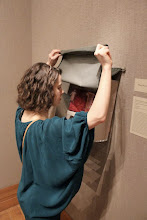Warhol embraced the fallacy of a picture just as he embraced the fallacy of façade. He purposefully follows his obsession of surface appeal with the tool of video. Perhaps by investigating the exterior Warhol happened upon some interior?
Warhol’s exhibition at MOMA this spring (2011) is glamorous. Black and white large video screens confront the viewer, head on. Though the heads on the video screens are much larger than life, they transfix without overwhelming.
The sleeping video dominates the first room. It is the ultimate conceptual perfection of the limitation of what the exterior can reveal. The sleeper is lost in a rich world beyond the reach of visual documentation and we are left with a barely moving image of a head with closed eyes. There is no understanding of this person because there is no conscious communication.
In the second room each video screen shows a different approximate 4-minute filmed duration of each person. Watching these individuals you understand very quickly how they carry themselves in the world, how they consciously communicate without words. Some are tough, some are playful, seductive, artificial, calculated, serious, candid, but they all serve a purpose, to create a connection to the social world outside. Because who would we be without an identity?
Obviously we live in a visual-based culture. The exterior is valued and therefore manipulated with great care. The abundance of street-style and celebrity celebration is unignorable and imbued in self-awareness. An immaterial fantasy of oneself moves aside for a more material and true reality of oneself, based on photograph and video. Books are read less than movies and television. Celebrities are photographically sought after, face book pictures, paparazzi, everyone is looking at themselves.
A fantasy of oneself is necessary because we must learn to carry our intangible insides somehow. (Our soul?) We must learn how to operate in a society that unavoidably adheres to stereotypes and generalizations and categorizations. Are we truly ourselves only when we are alone? Where is the true self? Fantasy allows us to filter our true selves, to learn how to funnel something intangible and unverbalized into a form. We decide to lean left more or lean right based on how others react to us and our judgment of others. We become masters at playing ourselves.

No comments:
Post a Comment